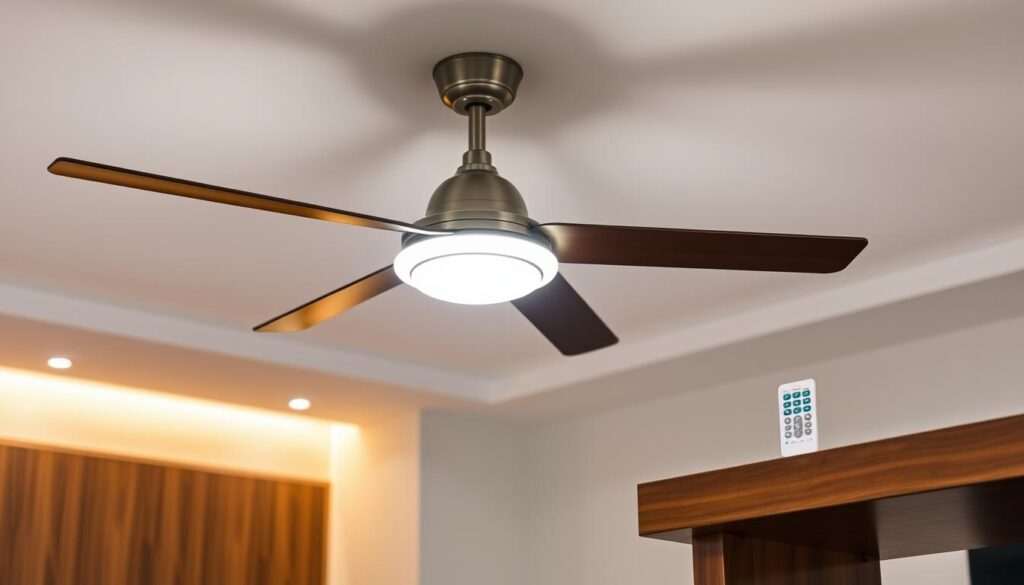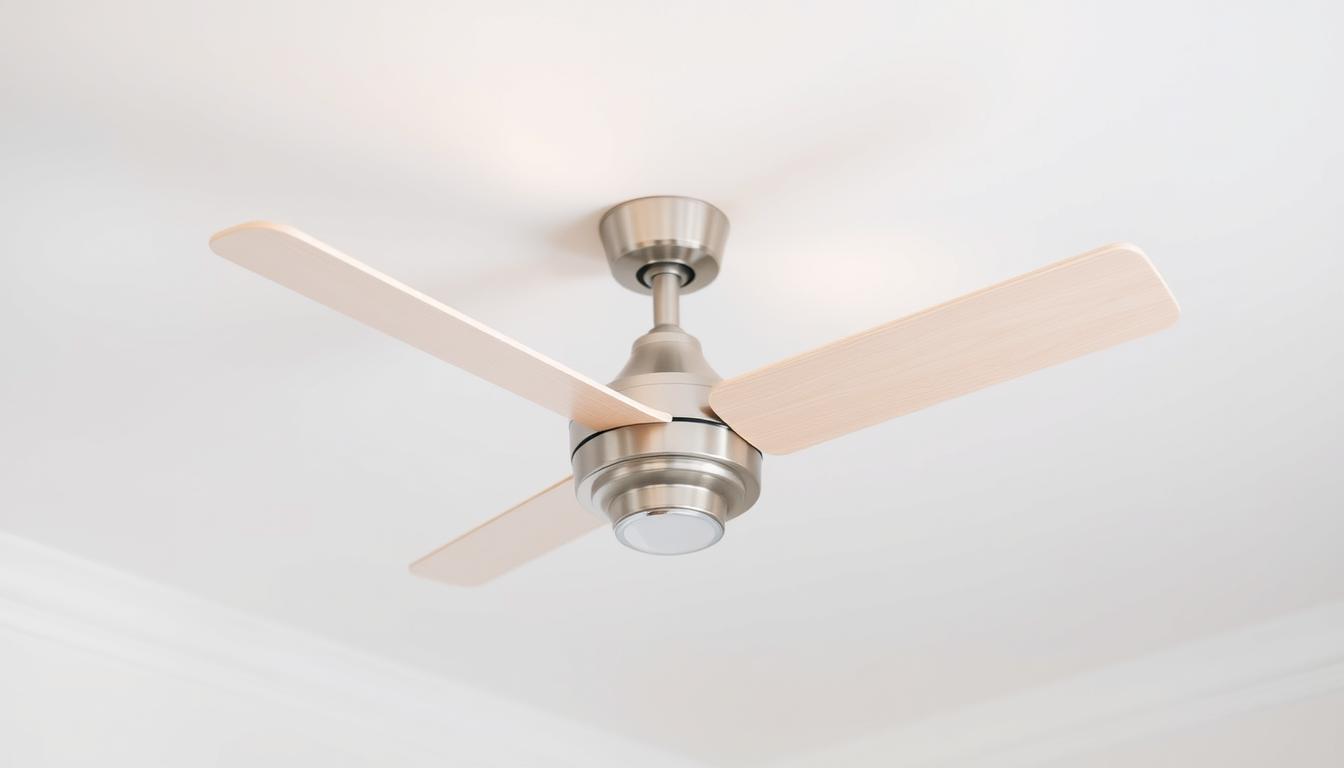Ceiling fans are a must at home. But then when they won’t turn off it gets irritating. Whether you have a simple small DC ceiling fan or one with lights, fixing the minor issues can make all the difference.
Key Takeaways
- Understand what happens when a DC ceiling fan breaks down.
- Repair remote control problems such as battery or sync problems and run your fan.
- Remove and repair circuit board and wiring problems that make your fan not switch off.
- Setup your DC ceiling fan the right way and make it work again.
Be sure to keep your DC fan clean and maintained so you never have any issues down the road.
Understanding DC Fan Technology and Common Operating Issues
The popularity of DC ceiling fans are for its energy saving and adaptability. They are made with cutting-edge motors, whereas conventional AC fans aren’t. Let’s see what these fans look like in the differences and essential parts.
How DC Fans Differ from Traditional AC Fans
DC fans run on direct current, often from a DC power supply or battery. AC fans, on the other hand, use alternating current, the usual household power. This difference gives DC fans several benefits, including:
- Greater energy efficiency, less money on your bill.
- More peaceful operation, lower motor buzz.
- Less large, more controlled speed control, sometimes via remote.
- They pair well with renewable sources of power such as solar cells.
Basic Components of DC Ceiling Fans
The BLDC (brushless DC) motor is the heart of any DC ceiling fan. It’s more efficient and lasts longer than AC fan motors. Other important parts include:
- Blades: These move the air
- Control by Remote: Wireless speed and directional direction.
- Downrod: Mounts motor and attaches to the ceiling.
- LED light kit (sold separately): For low energy lighting.
Normal Operating Patterns vs. Malfunctions
A best small dc ceiling fan or dc ceiling fan with remote should work smoothly. It should have:
- Well oiled, silent motor at all speeds.
- Great ventilation in the room.
- Responsive remote control
- Lighting is steady (if it’s an LED light kit)
A fan that does not run smoothly, or it cycles in an abnormal pattern or it sounds loud, it could be time to repair it. This might be by trying to troubleshoot or contacting a professional.
Common Reasons Why Your DC Ceiling Fan Won’t Turn Off
If you’re stuck with an dc ceiling fan with light or ac and dc ceiling fan won’t shut off, that’s annoying. But there are some shared reasons for this. By knowing these you can correct the issue quickly.
This is the most typical one: the remote control. Maybe the batteries are dead, or the remote and fan receiver are out of sync. This will prevent the fan from being turned off when you hold the remote.
- Remote control battery and signal issues
- Remote-receiver synchronization problems
There’s a damaged circuit board, too. This will leave the fan running even when you restart. Sometimes it is a wiring problem. An unplugged or broken wire can make the fan impossible to work correctly.
| Reason | Description |
|---|---|
| Remote control issues | Drained batteries or desynchronization between remote and receiver |
| Circuit board malfunctions | Faulty circuit board causing the fan to remain in operation |
| Wiring problems | Loose or damaged connections preventing the fan from responding to the power switch |
If your dc ceiling fan with light or ac and dc ceiling fan still won’t turn off, get help from a pro electrician. They can find out what’s wrong and fix it for you.
Troubleshooting Remote Control Problems in DC Fans
When you have a DC ceiling fan that won’t shut down, it can be a real pain. Often, the issue is with the remote. We’ll consider issues and solutions for common problems both with dc ceiling fan with remote and with small dc ceiling fan.
Battery and Signal Issues
First, check the remote’s batteries. The remote can stop functioning due to weak or dead batteries. Replace them and see if it works.
The signal can be messed up by other devices or obstructions as well. Bring the remote nearer to the fan or eliminate obstructions.
Remote-Receiver Synchronization Steps
if the remote still won’t get it, perhaps the fan receiver is not communicating with it. Here’s how to fix that:
- Search for the learn or sync button on the fan or wall control.
- Hold the button down until fan lights flash.
- Hit a button on the remote as soon as you receive it to connect it to the receiver.
- The fan’s lights should blink again, showing it’s connected.
When to Replace Your Remote Control
If you’re remote doesn’t respond after these steps, you might need to replace it. It will break due to old components or housing failure. Seek a replacement remote for your dc ceiling fan remote or mini dc ceiling fan from the manufacturer.

Circuit Board and Wiring Issues in DC Fans
Whether it’s your best small dc ceiling fan or ac and dc ceiling fan, circuit board and wiring issues are complicated. These components are the lifeblood of your fan. But they can also be a mess.
The most typical one is a bad control board. This board controls fan speed and more. Break it, and your fan won’t work, might not run very fast, or won’t remain on forever.
Look for burnt out or scorched parts on the control board.
Test wiring to the control board and check that it is tight and not tangled.
It will need replacing by a professional, if it’s the control board.
It can be the wiring issues in the fan, too. Wires sag, they fray, they rust. That can make the fan not kick in, speed up and down, or shut off unexpectedly.
- Inspect the wiring for leaks or sagging.
- Fix broken wires or replace faulty ones, if you don’t mind.
- But if it is a big wiring problem, get a professional electrician to do it properly and safely.
Repair circuit board and wiring in your best small dc ceiling fan or ac and dc ceiling fan is not an easy task. You need these things to make your fan function. Don’t know how to address these issues, make a call to a professional HVAC contractor. They know where to go and how to fix it.
Step-by-Step Guide to Reset Your DC Ceiling Fan
Changing the DC ceiling fan resets common issues such as your fan doesn’t switch on or behaves weird. Let’s explain what to do to reset your fan, from quick resets to factory resets. We’ll also show you how to reboot your fan after a reset.
Power Cycling Methods
Reset Your DC Ceiling Fan By Power cycling, You Can Reset Your DC Ceiling Fan In Easy Steps. Turn power off and then back on. Find your fan’s circuit breaker or wall switch and shut it off. Give it 30 seconds and switch it on again.
This will repair small issues and make your fan work again.
Factory Reset Procedures
If you would like to get to the very deep reset, then you may want to do a factory reset. This will reset your fan to its factory defaults, resolving any programming or remote control problems. See your fan’s instruction manual for detailed instructions as they may vary.
Usually you will have to power it on and off while pushing some buttons on the fan or remote.
Post-Reset Configuration Tips
Once your fan is reset, there might be some settings to tweak. The fan speed, brightness of lights and more are customizable. you also might have to plug or re-acquire your remote control.
Consult your fan’s user manual for how to configure it and set it up after a reset.
FAQ
What are the key differences between DC and AC ceiling fans?
DC ceiling fans use more energy-efficient motors than AC fans. They often come with features like remote control, energy-saving modes, and quieter operation.
What are the basic components of a DC ceiling fan?
A DC ceiling fan is composed of motor, blades, housing, downrod and remote. Motor drives the blades of the fan. Speed and direction can be set easily on the remote.
How can I tell if my DC ceiling fan is malfunctioning?
For things such as fan not on/off, noises, changing speed and insufficient airflow. These might be issues with the remote, or the circuit board, or wiring.
Why won’t my DC ceiling fan turn off?
For reasons such as missing remote, circuit board damage, or wiring problem, DC fan can stay on. Check these pieces to resolve the issue.
How can I troubleshoot remote control problems with my DC ceiling fan?
Check the batteries first and make sure you have clear sight lines between the remote and fan receiver. Perhaps you have to restart the remote and receiver according to the manufacturer’s directions.
What should I do if the circuit board or wiring is causing my DC fan to stay on?
It could be a circuit board or wiring problem so go get an electrician. DIY repairs can be risky. You can have it fixed by a professional technician safely.
How do I reset my DC ceiling fan to factory settings?
Restart your DC fan: turn the circuit breaker off for a few minutes, then power it back on. Other fans also have a reset button or reset sequence.
